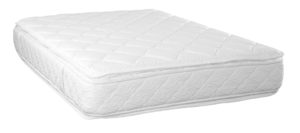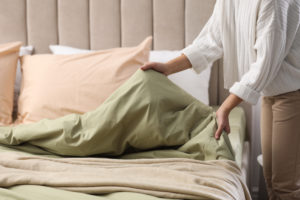One of the most common foundations of optimal health is a good night’s sleep. Sleep heals our body and mind, and a lack of it can be hugely detrimental. But there are many factors that go into great sleep, not the least of which is the tools we use to achieve that slumber. Our mattress, sheets, pillows and other accompaniments play a big part in good sleep.

Take it to the mattress
We all sink down on that mattress every night, and it is truly the foundation of our sleep. A good or bad mattress can make or break your sleep each night. Investing in a quality mattress and knowing when to replace it can be key in your comfort. Sleep Foundation recommends that you replace your mattress at least every 6 – 8 years or if you notice adverse effects after sleeping on it, including muscle aches and pains, joint stiffness or allergies. You also may have a damaged or infested mattress, which includes sagging, excessive heat, bed bugs or dust mites. Finally, you may just have a mattress that doesn’t fit your body’s needs and find yourself tossing and turning night after night.
Choosing the best mattress means understanding the different types of mattresses out there, which may depend on your sleep position (side, stomach, back or a combination) and your weight and health needs. In general, back sleepers do better with medium firm to firmer mattresses; side sleepers do better with medium soft to medium firm mattresses; and stomach sleepers benefit from firm mattresses, according to Sleep Foundation. Combination sleepers should opt for medium firm mattresses. People with chronic back pain need to consult with their doctor or orthopedist to determine the mattress that best helps their condition.
Experts agree that whatever you choose, the investment in a high-quality mattress is well worth it.
Keep it clean!
Once you’ve set the mattress as a foundation, it’s important to understand how keeping your bed clean and tidy can affect your sleep. There’s no point in investing in a mattress if you don’t maintain it. That means keeping it clean and free of icky things like dust mites. “Dust mites are microscopic creatures that are very common … and can lead to skin rashes and irritation, and may worsen allergy symptoms for many people,” said Sleep Foundation. Tens of thousands of dust mites may be on your mattress and bedding at one time. That’s why keeping your mattress and bedding clean is so important.
Strip your bedding regularly and wash it. Why is it so important to wash your bedding? For one, they harbor not only dust mites, but dead skin cells, dirt, body oils and sweat. Sleep Foundation recommends you wash your sheets at least once a week or more if you share your bed with a pet who may shed. Read laundering instructions carefully on your bedding and wash at the hottest temperature allowed with gentle detergent. You may consider an extra rinse if you suffer from allergies. Dry on low setting.
What about other items on your bed? Sleep Foundation recommends washing duvet covers every two weeks to a month while comforters, blankets and pillows (if washable) can be washed every month. Be sure to follow all laundering instructions.
To go beyond bedding, Architectural Digest recommends deep cleaning your mattress regularly. Stock up on a vacuum with an upholstery attachment, an enzyme cleaner for stains, baking soda, cloths and cold water. Vacuum your mattress first then treat stains with the enzyme cleaner. Sprinkle baking soda and let it sit, and finally flip your mattress.

Catching those Zzz’s
Once your mattress and bedding are clean, how do you keep up sound sleep habits? Were Mom and Dad right, and does making your bed lead to a better night’s sleep?
According to a famous speech by Naval Admiral William McRaven, author of the book “Make Your Bed: Little Things That Can Change Your Life … and Maybe the World,” making your bed at the beginning of the day gives you a sense of accomplishment. “It will give you a small sense of pride, and it will encourage you to do another task and another and another,” McRaven said in his 2014 commencement address at the University of Texas at Austin. “By the end of the day, that one task completed will have turned into many tasks completed.”
The importance of your bed
A National Sleep Foundation survey found that people who make their bed in the morning are 19% more likely to have a better night’s sleep. In the same survey, respondents said that a “comfortable feel of bedding” was a vital part of beginning the sleep process. Bedding that is not made and may be bunched or messy may hinder, and not help, that transition to sleep.
Furthermore, the philosophy of Feng Shui believes that “the state of your environment attracts certain people, items and situations for a balanced life.” It is thought that a clean, well-ordered bedroom can be a good way to psychologically reap the benefits of a rested mind that can go on to accomplish many things throughout the day. A study in “Personality and Social Psychology Bulletin” found that women who described their living spaces as cluttered were more likely to be fatigued and depressed, said Verywell Mind. These women also had higher levels of cortisol, a stress hormone, the study said.
On the contrary, critics of bed-making may say that it can contribute to added stress every morning if it is just one more task that has to be completed. Many people grow up not making their beds and may be used to that habit. Many people like to have their sheets “air out,” as it can help to decrease moisture that may have built up overnight.
The best rule of thumb for making your bed, or not, may be ensuring that it does not add to your stress level. If making your bed puts you more at peace, go ahead and do so, but if not, keep it undone.
*Investing in a high quality mattress, regular sheet washing, good sleep hygiene habits and perhaps even making your bed can make the most of your time spent in bed and improve your sleep health.
RELATED ARTICLES
Say Aloha to Hula Hoop Fitness
Can Being Fully Present Make Me Healthier?
How Does Weather Affect Our Skin?

